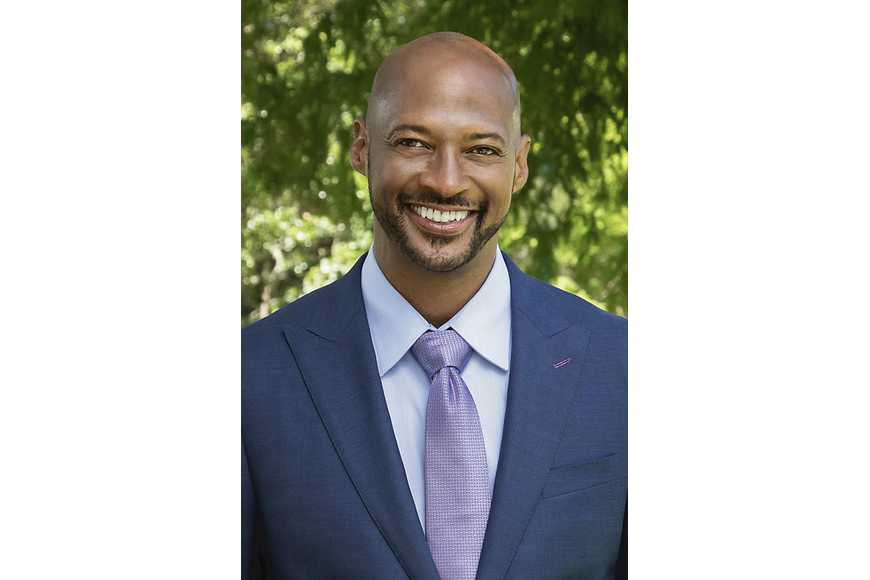Judge defers decision on request to dismiss lawsuit against Sarasota Commissioner Battie

After one of Sarasota’s continuing political controversies moved from city hall to the courthouse, a judge this week said he will issue a written order on whether to dismiss a lawsuit against Commissioner Kyle Battie by local activist Kelly Franklin.
Lawyers for Battie and Franklin, respectively, argued before Sarasota Circuit Judge Stephen Walker and about a dozen spectators in a seventh-floor courtroom at the downtown Silvertooth Justice Center on Tuesday.
On the docket: Whether to dismiss a lawsuit against Battie, which contends he defamed and inflicted emotional distress on Franklin, a local activist, when he publicly accused her of posting a racist message about him on Facebook.
The legal dispute did not focus on the post’s validity. Franklin maintains that it was a hoax and that the commissioner was involved in a plot to destroy her credibility.
Brian Goodrich, of the local firm Bentley Goodrich Kison, argued on behalf of Battie in a 20-minute opening statement. Since the commissioner spoke out during a City Commission meeting as part of a meeting agenda item, Goodrich argued, the commissioner has immunity from legal action.
Richard Harrison, a Tampa-based attorney representing Franklin, asserted that Battie used a public platform to air personal grievances. The dispute over the post, and Battie's feelings on it, were not city business and the commissioner is not entitled to legal protection just because he made his comments at a city meeting, Harrison argued.
“If the judge agrees with them and dismisses our case, based on the immunity, then we’ve got the right to immediately appeal. And we’ll certainly do that,” Harrison told the Herald-Tribune after the court session.
If the judge dismisses the case because Battie qualifies for immunity because he was acting within the scope of his office, Harrison believes the city would be liable for damages.
“We’re suing him personally, not suing the city. If this judge says he was acting within the scope of his office, we’re going to be suing the city of Sarasota,” Harrison said.
Walker did not indicate when he expected his written decision.
The ongoing drama began at a January City Commission meeting when Battie added a last-minute agenda item to bring up an apparent Facebook post from Franklin. A printed screenshot of the post appeared to show Battie and Corona Cigar Company co-owner Tanya Borysiewicz accompanied with a racist epithet - referring to them as "gorillas".
Battie angrily referred to the racial nature of the post.
“I don’t mind you disagreeing with me because you have a different perspective and opinion than I do, but I expected you to do so based on merit, not the color of my skin,” Battie said at the meeting. “This is sick, abhorrent, and egregious.”
While Battie did not mention Franklin by name, the screenshot clearly showed her identity, and other city commissioners remarked they were surprised “this individual” would have such a post.
Debate over Facebook post
However, Franklin – who was watching the meeting online – emailed the commission to say the post was a fake.
Harrison said in a statement that the original post was about photos of actual gorillas on a safari trip his client took, accompanied by “stunning photos" taken there.
After Franklin filed a lawsuit against Battie, the City Commission voted to pay $15,000 for his legal defense, with further installments subject to a vote.
An invoice obtained via public records request shows the city paid $11,038 to Bentley Goodrich Kison in March.
The motion to dismiss the suite criticized Franklin for a “shameless” branding of Battie of having perpetrated a hoax to defame her.
“Franklin is deeply mistaken,” the motion said. “Commissioner Battie did not defame Franklin and, while Commissioner Battie would relish the opportunity to prove as much, this Court must dismiss Franklin’s case with prejudice for another reason.”
That reason is the contention that Battie is immune from a suit even if he knew his allegedly defamatory statements were untrue, because of his role as a city commissioner.
In response, Franklin claimed that since Battie “intentionally orchestrated the entire matter” and used the public meeting as cover, his comments fall outside his official duties.
Harrison argued that his client’s private speech on social media is protected by the First Amendment and that a city official had no legitimate business bringing the matter into a public meeting. Goodrich said that when he brought attention to the post, Battie’s speech to the commission referenced the Sarasota city code and was thus a valid use of his scope of office.
“Discriminatory practices are contrary to the public policy of the city and are a menace to the public peace and welfare of our citizens,” Chapter 18 of the city code says. “The city shall direct its efforts and resources toward eliminating discriminatory practices within the city in the areas of housing, employment and public accommodations where they exist.”
Contact Sarasota Herald-Tribune Local Government Reporter Christian Casale at ccasale@gannett.com. Follow him on Twitter @vanityhack.
This article originally appeared on Sarasota Herald-Tribune: Judge to issue written decision on lawsuit against Sarasota's Battie

